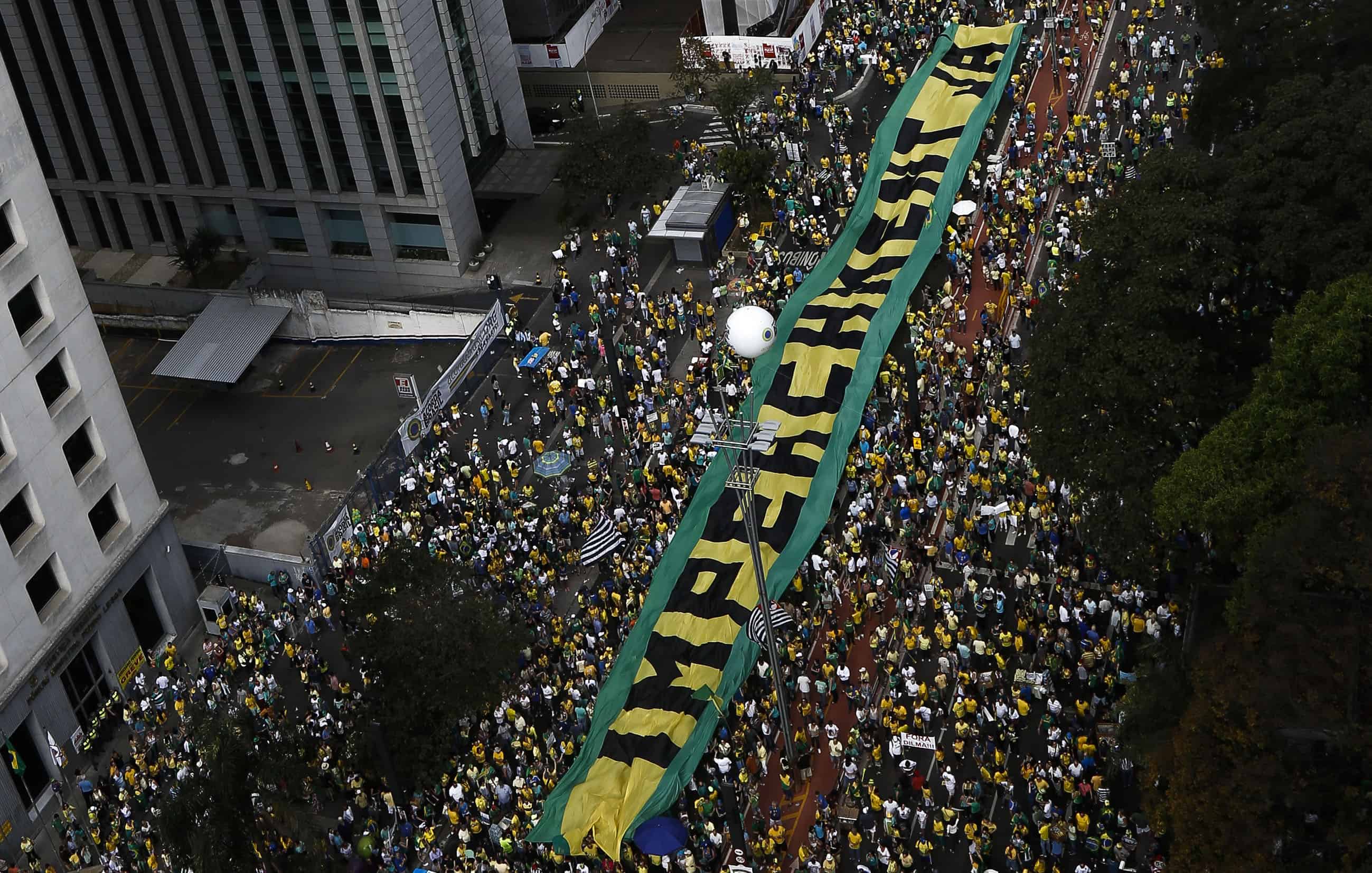This story was updated at 6:50 p.m. with new turnout estimates and reaction from Brazilian President Dilma Rousseff.
SAO PAULO, Brazil — Huge numbers of protesters demanded Brazilian President Dilma Rousseff’s resignation Sunday, blaming her and the leftist Workers’ Party for runaway corruption and looming recession in Latin America’s biggest country.
Crowds chanting “Dilma out!” and singing the national anthem paraded through the capital Brasilia, Rio de Janeiro, the country’s largest city São Paulo, and across Brazil.
With the São Paulo demonstration yet to be counted, the G1 news site reported the latest police estimate for turnout to be 866,000 in dozens of cities and towns.
Organizers claimed a total of 1.9 million, including a million in São Paulo, where police counted only 350,000.
It was the third major anti-Rousseff protest this year, with 600,000 and at least one million demonstrators taking to the streets in April and March, respectively.
Less than a year into her second term, Rousseff is all but a lame duck, facing an opposition that smells blood and considering impeachment proceedings.
“Our goal is to change Brazil,” said Rogerio Chequer, leader of the Vem Pra Rua (Go on the Streets) group among those organizing the protests.
“We can’t take this corruption any longer, these levels of misery and suffering. You can’t have millions of reais siphoned off each year. That’s why we’ve had enough,” he said at the Sao Paulo march, where many in the crowd wore the national football team’s famous yellow shirt.
“If Congress has even a minimum of sense, it will decide on impeachment.”
Rousseff, a former leftist guerrilla, has likened impeachment threats to a coup plot and insists she will not be forced from office.
Late Sunday, her spokesman Edinho Silva said “the government sees these demonstrations as part of normal democracy.”
Carnival and corruption
The world’s seventh-largest economy is sliding into recession, its credit rating reduced to near junk status.
Austerity measures have replaced the economic go-go years fueled by Chinese demand for commodities, while an ever-expanding bribes and embezzlement probe centered on state oil company Petrobras is ripping through the country’s elite.
The boisterous but peaceful crowds in towns and cities across the country pinned the blame on Rousseff, illustrating how Brazil’s “Iron Lady” has become the least popular president in modern times, with single-digit ratings.
In Brasilia, retired engineer Elino Alves de Moraes, 77, called for Rousseff and her “gang” to be jailed.
“We want things to change and if the people don’t go in the street that’s impossible,” he said.
In Rio, there was a carnival-like mood, with samba music blasting, some protesters carrying surfboards, others riding skateboards, and many wearing bikinis or bathing suits.
But protesters said they were totally serious about wanting Rousseff and the Workers’ Party out.
“They’re looting Brazil, stealing everything,” said Jorge Portugal, 63, who is retired from a job in marketing.
At a rally in Belo Horizonte, the man who narrowly lost to Rousseff in her deeply divisive 2014 reelection, Aecio Neves, said the protests show that “Brazil has woken up.”
But one of the most popular heroes for the opposition masses was not Neves or even a politician — it was Sergio Moro, the 43-year-old judge handling the Petrobras cases.
“We are all Moro,” placards read, and “Power to Sergio Moro!”
“Judge Moro is the country’s salvation,” said one Sao Paulo protester, Jose Freitas, 88.
Impeachment threat
Prosecutors running the Petrobras probe have brought charges against a who’s who of Brazilian movers and shakers, including the billionaire head of the global construction company Odebrecht and a navy admiral once tasked with overseeing a secret nuclear program.
Rousseff’s Workers’ Party has been badly shaken by the scandal and she has been tainted by association, even if not directly implicated. Her party’s treasurer was among those arrested in April.
Even Rousseff’s presidential predecessor, Workers’ Party hero Luiz Inacio Lula da Silva, is being investigated in an unrelated influence peddling probe.
A key figure in the fragile governing coalition, House Speaker Eduardo Cunha, defected in July and is considering whether to pull the trigger on impeachment proceedings.
Analysts say Cunha — under investigation for allegedly demanding a $5 million bribe — is waiting to be sure that Congress would follow his lead, while Rousseff is racing to negotiate a truce.
One possible relief for her came earlier this week when she and Senate President Renan Calheiros — under investigation in the Petrobras affair — agreed to market-pleasing reforms.
The deal took Rousseff ever further from her socialist roots, but could help lure her right-wing opponents from the cliff edge.
“The middle classes want to kick her out of power in any way, but to what end?” asked André Perfeito, head economist at Gradual Investimentos.
“In business circles and the elite, there’s an idea that it would be even worse if she left. It doesn’t mean they’re for Rousseff, but that getting rid of her would be even riskier.”






